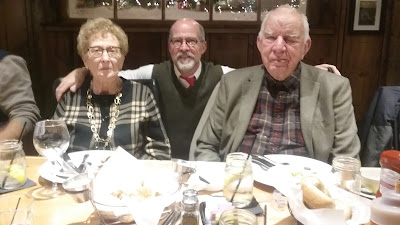Bereft now of both my parents, I am an orphan at 61. Adult
onset orphanage is the best kind of orphanage because you’ve had all the
benefits of their parenthood lifelong—with a few, it is true, of the
difficulties. Moreover, at senior orphanage, you have the added benefit of the
lessons of their dying at a time in your own life when those lessons are more
likely to be heeded. The chief distinction to be made here, an obvious one, but
at the same time one we often fail to make (fudging death and dying into a
single concept) is that death is death, the finality, and dying the process thereunto.
Some philosophers and writers argue that we are always in
the process of dying. I don’t think so. As a metaphor, it has its melancholy
attraction, but as a working assumption for life, it is lugubrious. While we
inhabit an entropic universe as agents of disorder, for at least some of our
time here on earth, we are, rather, creating our lives, an internal order of
self, out of our genetic inheritance, our surrounding material world, and our
experience. We are living. This is life. At some point, and I place this point
much later in time than many—I place it long after our physical “prime of life,”
as it is sometimes called, or even after our cognitive prime—we begin to die.
My mother, as I recorded in this blog, died in early March.
But she began dying in the summertime, after the death of her sister-in-law, my
Aunt Jo, my father’s younger sister, who died last summer. Over sixty years of
familiarity, they had become “best friends,” my mother and Aunt Jo, who spoke
on the phone almost every day in their last years. When my mother lost that
connection, her physical and cognitive decline was swift. She suffered heart
problems and probably a stroke or two that left her mute. A woman of faith and
prayer, she had come to terms with both her dying and death, I trust, but because
we never talked about either specifically in those terms, I have still pangs of
doubt. Perhaps there is always vulnerability in the eyes of the dying, even the
most prayerful and faithful.
My father, on the other hand, had quite clearly come to
terms with death. A number of years ago he had relayed to me, convincingly,
that he was just “waiting for the call.” He had written his own epitaph, his
own obituary—which required some editing for length and relevancy—and had asked
me to speak at his funeral about his faith,
a task of no little delicacy given that I had left the Church forty-something
years ago. What he had not really considered nor understood, it seems to me,
was the process of dying. He seemed to think that he would simply, some
morning, wake up dead. Or, if he had to go through some formal process, he
would have my mother to help him through. Neither of those possibilities
eventuated.
Instead, grousing and grumbling about the pain in his right
chest and the general incompetence of the medical profession, and unacknowledgingly
missing his wife of sixty-three years, whom he had mistakenly imagined himself
to precede in death, and counseling me not to “get old,” (he was ninety-effing
five), he struggled with the process of dying. “Why am I still here?” he would
wonder of a new morning. Because most of us have to die to be dead, Pop. Process.
And so, he began, we think, to more or less starve himself, where
his pills represented the chief constituent of his diet, with a swallow or two
of Ensure. No more biscuits of Shredded Wheat, drowning soggily and all too
sweetly in milk or half and half; no more deep-fried Admiral’s Feasts; no shrimp scampi, “Ooh, that’s goohd;” no black
raspberry milkshakes, medium wings. His last meal was half a peanut butter
meltaway. Perhaps unknowingly, perhaps only unadmittedly starved for the love embodied in Rita’s full person—womanly, wifely,
motherly, grandmotherly, and just basic humanly—he seems to have gone on a
hunger strike of sorts and took the dying process back into his own hands. We buried him this past Tuesday next to her.
You can rest in peace now, old man.
